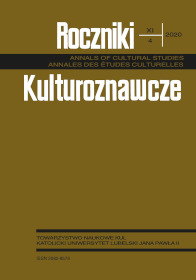Una mirada a la estética medieval al contraluz de la estética contemporánea
A Look at Medieval Aesthetics under the Backlight of Contemporary Aesthetics
Author(s): Víctor Manuel Tirado San JuanSubject(s): History, Anthropology, Social Sciences, Middle Ages, Culture and social structure , 13th to 14th Centuries
Published by: Towarzystwo Naukowe KUL & Katolicki Uniwersytet Lubelski Jana Pawła II
Keywords: medieval aesthetics; contemporary aesthetics; expansion of reason; proportion theory; open aesthetic canon
Summary/Abstract: The Author of this essay tries to show the value of medieval aesthetics by putting it in dialogue with some fundamental aspects of contemporary aesthetics. A description of those issues that most contrast with current culture is outlined: the predominance in the Middle Ages of religious faith and its fusion with the tradition of Greek thought in a metaphysical perspective, in order to elaborate the aesthetic theory, developing an ontological theory of beauty and art. On the contrary, the current era, still very indebted to modernity, is installed in a position of enormous metaphysical fragility and religious faith, excessively restricting reason to scientific rationality. In this sense, the Middle Ages can inspire us in the quest, already undertaken by certain currents of phenomenology, of expanding reason. In this framework, the difficulties of medieval aesthetics in order to conceive clearly the difference between beauty and good are analysed, then it has been something that has been done better in modern lines that have not lost the transcendental, from Immanuel Kant to Xavier Zubiri. Various conceptions of the Middle Ages are asserted, fundamentally from the hand of Umberto Eco, and without idealizing it, important values stand out in it nonetheless. The thesis is defended that it is not possible to completely renounce the theory of proportion, but that it must be expanded on the basis of a richer ontology, which, together with the ‘real-things’ of the world, takes into account the ‘sense-things’, according to the proposal of Xavier Zubiri. This allows us to critically assume the expansion of the aesthetic horizon (the opening of aesthetic values) typical of the contemporary without falling into nihilism.
Journal: Roczniki Kulturoznawcze
- Issue Year: 11/2020
- Issue No: 4
- Page Range: 21-50
- Page Count: 30
- Language: English

